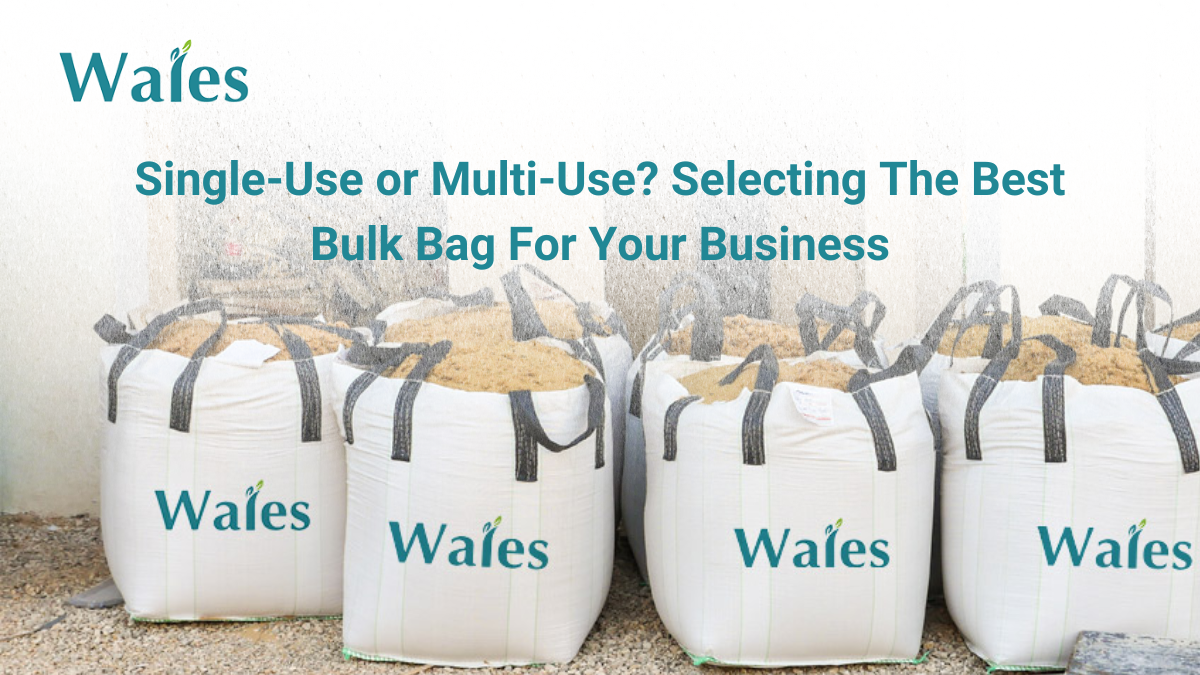
Bulk bags, moreover known as flexible intermediate bulk containers (FIBCs), are basic for businesses requiring effective capacity and transportation arrangements. These days, with the assistance of cutting-edge innovation a few multi-use and single-use bags are accessible. Choosing the proper sort of bulk bag can affect your work. Here’s a detailed guide to assist you in selecting the top-quality bulk bag custom-made for your business needs.
Single-use bulk bags are laid out for one-time utilisation and are frequently made from polypropylene. These disposable packs are idealised for transporting powders, grains, or granules. Once utilised, they are arranged and supplanted, making them a supportive choice for businesses prioritising cleanliness and security, such as nourishment handling and pharmaceuticals.
Multi-use bulk bags, additionally known as reusable bulk bags, are made of woven polypropylene for quality and can withstand distinctive cycles of applications. These packs are idealised for businesses that require heavy-duty handling, as they are solid and arranged to last longer, advertising predominant cost proficiency over time.
Single-use bulk bags are generally less expensive than multi-use bulk bags. However, the cost of using single-use bags can add up quickly if they are used frequently. In contrast, multi-use bulk bags require a higher upfront investment but can be cost-effective in the long run due to their durability and reusability.
Single-use bulk bags contribute to waste, which can be critical if disposed of improperly. Multi-use bulk bags offer an eco-friendly alternative by diminishing waste and preserving resources, adjusting to sustainable business needs. This is one of the main advantages of multi-use bulk bags over single-use.
Single-use bulk bags: For businesses where cleanliness may be a must, such as food process, single-use bulk bags culminate as they minimise contamination dangers.
Multi-use bulk bags: They must be cleaned and looked into routine to protect sterile measures, making them superior suited for non-sensitive materials.
Single-use bulk bags are compact and less demanding to store, making them reasonable for businesses with limited storage capacity. Multi-use bulk bags require extra space for proper storage to preserve their quality and durability.
Businesses looking to reduce their carbon impression may discover multi-use bulk bags more engaging due to their reusability and diminished environmental impact. Further, the environmental impact of disposable bulk bags tends to be much less than in comparison with other bulk bags.
The choice between multi-use and single-use bulk bags depends on your particular business needs:
Refer or other blogs to learn Choosing The Best Bulk Bags For Your Business: All You Need To Know.
At Wales Industries Australia, we specialise in giving high-quality, tough bulk bags tailored to your business requirements. Whether you’re trying to find multi-use bulk bags for long-term applications or single-use bulk bags for particular needs, we have the ability and arrangements to meet your desires. However, the final decision can only be obtained when one understands the differences between single-trip and multi-trip FIBC bags. Refer to our other blog about Buy Bulk Bags from One of Australia’s Leading Suppliers.
By the time you might have a clearer idea of how to choose between single-use and multi-use bulk bags! If still uncertain about the proper bulk bag for your business? Contact Wales Industries Australia today for personalised suggestions and top-quality bulk bag solutions. Let us assist you in streamlining your operations while prioritising productivity and supportability.
The type of fabric, capacity prerequisites, and transportation requirements will all impact your choice of bulk bag. Single-trip bulk bags are idealised for segments like food and pharmaceuticals with tall sterile necessities. Due to their strength, multi-trip bulk bags are ideal for businesses that put a high esteem on cost-effectiveness and sustainability. To make an informed decision, evaluate elements such as load capacity, safety regulations, and environmental effects.
FIBC bags approved for many applications have a 6:1 Safety Factor (SF) rating. These bags are put through a comprehensive testing process to guarantee their strength and longevity, making them dependable for frequent handling and transit. Always verify the SF rating and adhere to the recommended usage instructions to ensure safety, by following the safety guidelines for using bulk bags in Australia.
Multi-trip bulk bags provide durability, financial savings, and environmental advantages. For regular usage, their reusable nature lowers waste and total expenses. They are also constructed from sturdy materials, such as woven polypropylene, which guarantees the safe handling of large weights over several cycles. Additionally, when comparing durability of single-trip vs. multi-trip bulk bags, you’ll find multi-trip bulk bags more durable.
Verify the Safety Factor (SF) rating of the bag; a 6:1 SF suggests that it is suitable for reuse. After every usage, check the bag for wear or damage. Make sure the stitching and material quality satisfy industry standards, and adhere to the manufacturer’s reusability instructions.
Single-trip bulk bags are frequently used in sectors including food processing, medicines, and agriculture that have strict hygienic standards. For one-time use situations, these bags are perfect for carrying chemicals, grains, or powders since they avoid contamination.
Multi-trip bulk bags ought to be kept out of direct daylight and in a clean, dry environment to prolong their life. After each utilisation, altogether clean the bags, check them for wear and tear, and settle any little issues right away. Repeated and safe usage is ensured by following these guidelines.
Security prerequisites like AS 3668-1989, which guarantee the strength, life span, and secure handling of FIBCs, must be followed by bulk bags in Australia. Adherence to these rules guarantees that bulk bags, whether single-trip or multi-trip, are utilised securely over a range of divisions.